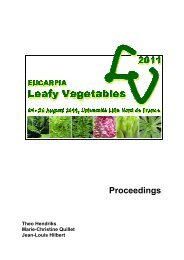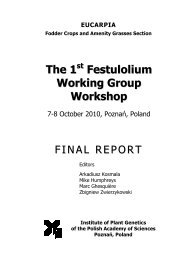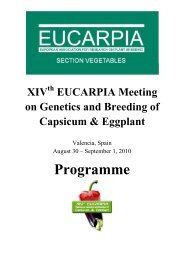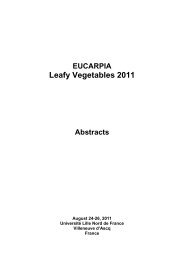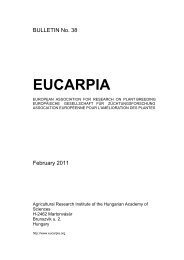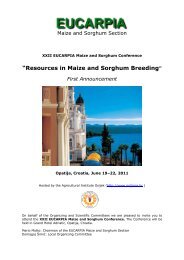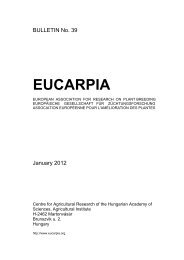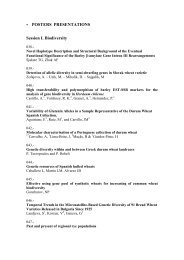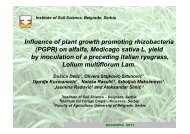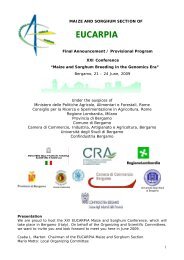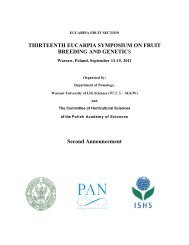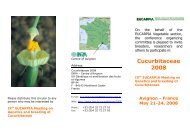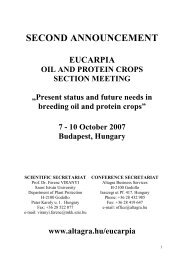Plant breeding for organic and sustainable, low-input agriculture
Plant breeding for organic and sustainable, low-input agriculture
Plant breeding for organic and sustainable, low-input agriculture
You also want an ePaper? Increase the reach of your titles
YUMPU automatically turns print PDFs into web optimized ePapers that Google loves.
Farmer`s eye <strong>and</strong> breeder`s eye – fields of knowledge exchange as a condition of a<br />
participatory cereal <strong>breeding</strong> approach<br />
Martin Timmermann<br />
Cereal Breeding Research Darzau,Germany<br />
With the change to <strong>organic</strong> <strong>agriculture</strong>, the diversity of local conditions becomes more<br />
important. Local adapted varieties are necessary. But <strong>breeding</strong> <strong>for</strong> this dem<strong>and</strong> is not profitable<br />
<strong>for</strong> the conventional <strong>breeding</strong> strategy. An alternative can be a participatory <strong>breeding</strong> approach.<br />
Evolved in the context of international development cooperation, this approach is increasingly<br />
discussed in the European context. Communication between farmers <strong>and</strong> breeders is a key issue<br />
in participatory <strong>breeding</strong>. Farmer`s <strong>and</strong> breeder`s eye have different perspectives on the plants<br />
<strong>and</strong> different knowledge gained through experience. Those perspectives <strong>and</strong> experiences need to<br />
be exchanged. As an outcome of the investigation of “The breeder`s eye” on the example of the<br />
cross<strong>breeding</strong> of self-fertilizing cereals from a knowledge sociology perspective three levels of<br />
consciousness could be described: vegetational consciousness, generational consciousness <strong>and</strong><br />
consciousness in hereditary f<strong>low</strong> (Timmermann, 2006). The framework of these three levels<br />
al<strong>low</strong>s to underst<strong>and</strong> the various levels of <strong>breeding</strong> behaviour <strong>and</strong> how the breeders learn <strong>and</strong><br />
develop their <strong>breeding</strong> practices. Based on this results, fields of knowledge exchange between<br />
farmer <strong>and</strong> breeder, their limits <strong>and</strong> possibilities <strong>for</strong> further development can be worked out.<br />
There are three kinds of exchange fields of knowledge in the context of PPB: a field of<br />
correspondence <strong>and</strong> agreement, a field of learning <strong>and</strong> a sphere of competence, which is more or<br />
less inaccessible <strong>for</strong> each other.<br />
a) A correspondence of knowledge between farmer <strong>and</strong> breeder can be found <strong>for</strong> agronomic<br />
tasks. About these topics <strong>and</strong> how to realize it technologically farmer <strong>and</strong> breeder can<br />
communicate <strong>and</strong> cooperate very well. Both, farmer <strong>and</strong> breeder are familiar in thinking about<br />
sowing, cultivation <strong>and</strong> harvesting in the context of seasons <strong>and</strong> vegetation.<br />
b) Fields of learning: In the process of selection, the farmer has to learn in which <strong>breeding</strong><br />
generation <strong>and</strong> context useful decisions can be made, finding a step into the consciousness of the<br />
different <strong>breeding</strong> generations, while the breeder is broadening his knowledge about the possible<br />
reactions of <strong>breeding</strong> lines to a new environment.<br />
c) There are spheres of competence <strong>for</strong> the farmer concerning his intimate knowledge about his<br />
localities, its development over years <strong>and</strong> about the special dem<strong>and</strong>s of the markets where he<br />
sells. On the part of the breeder there is a deep knowledge about the <strong>breeding</strong> material, about the<br />
relevance of the different traits, about their realization in the <strong>breeding</strong> material <strong>and</strong> about the<br />
practical <strong>breeding</strong> know how. In planning of crossings lies a field of knowledge <strong>and</strong> competence,<br />
that only can be achieved by proceeding professionally.<br />
The design of a PPB program should consider these aspects. Farmers <strong>and</strong> breeders are experts in<br />
their fields of knowledge. With a clever integration, both parts can profit from each other <strong>and</strong><br />
increase the entire knowledge. From this perspective, a participatory approach is not a one way<br />
matter. Knowledge will be gained through experience by farmers <strong>and</strong> breeders, but on different<br />
levels. To consider this levels of knowledge exchange <strong>and</strong> above all of knowledge gained<br />
through experience is a measure to increase the success of participatory <strong>breeding</strong> programs.<br />
72




